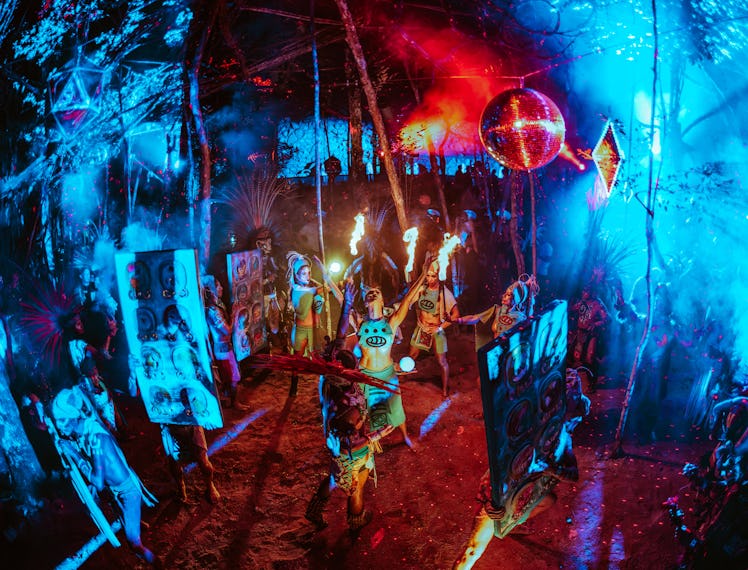Day Zero Turns a Tulum Jungle Into an Electronic Music Festival

Damian Lazarus caught his first glimpse of Tulum while seeking refuge. After DJing at a party in Playa del Carmen—a once-sleepy fishing town in the Yucatán that 20 years ago already hosted a buzzy nightlife scene—he was planning to unwind over drinks. Just then, the skies opened in a torrential rain, and impulsively, he and a friend headed to the Caribbean coast to a place he’d been told about: Tulum. While they were driving, the deluge stopped. “I thought that was a good sign,” he says.
As they walked out to the beach, which was illuminated in the night by flashes of lightning, they could see only one light shining. “It felt like a miracle,” he recalls. “I couldn’t believe I had found such a quiet place on this planet, where there was such beauty and no people.”
Today, Lazarus, 47, organizes an annual rave, Day Zero, that is attended by about 9,000 in a Tulum that is barely recognizable. Resort hotels line the beach, a commercial strip has mushroomed at the other end of town, and Tulum is a favorite stop on the international party circuit.
Lazarus inaugurated Day Zero in 2012. By that time, Tulum, frequented by fashionistas with a taste for spirituality and yoga, was no longer undiscovered. Neither was Lazarus. In 2003, the same year he stumbled on Tulum, he started an electronic dance music label, Crosstown Rebels, and he played in clubs around the world.
“Tulum was a place like no other, and I tried to keep it to myself, telling only close friends,” he says, with a thick East London accent. “But suddenly it began massively changing with huge hotels and restaurants. You could see the commercialization.”
In 2012, following a business imbroglio, he took a ten-day break with friends in a rented house in Tulum. On the advice of a Mayan shaman, he went one night at a prescribed hour to the beach to look at the moon with his hands up. “I immediately felt this kind of electricity blowing through my fingers and my entire body,” he recalls. “After five minutes, I felt like I was in an energy field and connected to the universe. I said, I think this is some kind of sign to me that with what is about to happen in this area, I should create an event here that recognizes the importance of the ancestors and the Mayan people and do my best to take care of the land.”
A burly, bearded man wearing a kind of kimono decorated with appliquéd dragonflies, he says with a chuckle, “That’s what I took from it. But maybe it was just strong ketamine.”
It was January 2012. “I remembered that later that year, December 21, was the end of the Mayan calendar,” he continues. “I decided that instead of looking at it as an apocalyptic event, it would be the beginning of a new chapter, and I would create a magical event that celebrates the traditions of the Mayan people and infuses it with the most heartfelt and innovative music.” So was born Day Zero. Just under 3,000 attended the first year, held in a Mayan theme park on the outskirts of Tulum.
Having tripled in size, with ticket prices ranging from $140 to $300, the annual party now takes place in a four-acre expanse of jungle a half-hour drive from Tulum, with three musical stages (including one that features only Mexican DJs) separated by trees adorned with twinkling lights. At Day Zero 2024, which started on January 12 and continued until noon on the 13th, lanterns glowed among the branches, eye-popping green lasers shot through the darkness, and a female acrobat performed overhead on a hanging hoop. As you wandered through the domain, even without chemical enhancement it felt as if you were in an enchanted forest.
Mayans in feathered costumes burned copal, a tree resin, in a traditional cleansing ritual. As Lazarus promised, Day Zero has engaged with the local community, supporting a music school for children, donating trees to line an avenue, collaborating with an organization that is trying to restore the coral reef, and collecting plastic refuse. The outfit works with a recycling company based in Cancun to convert plastic waste into biofuel; last year, the generators powering the party burned 230 liters that had been gleaned from the clean-up of the previous party.
Lazarus is scrupulous about enlisting Mexican artists, including emerging ones. Erika Polke, who is based in Guadalajara and performs worldwide under the name Mystery Affair, is one of the leading Mexican DJs who played at Day Zero. “I really like this festival because they put their heart in the community and really help the coral and the children,” she says. “It’s great to have a Mexican stage and that they are actually supporting local artists.” But she sighs at what has happened in Tulum during the last decade. “It is not great for the region,” she remarks. “Everything is too much.”
Damian Lazarus
The local infrastructure and natural environment struggle to cope with the garbage, sewage, and electricity demands that accompany the influx of thousands of partygoers. There is only so much one party promoter can do, and the remediation and community outreach practiced by Lazarus and Day Zero may function most powerfully as inspiration to others.
“It’s a very difficult balance when you make a party and charge a lot for tickets, and try to give something back at the same time,” Lazarus says. “It can seem a little pseudo, but because of my connection to the place, it feels real.” Just like the transformation of a patch of jungle into a musical fairyland, the social commitment of Day Zero requires a little magical thinking.
And magic goes only so far. “I’d prefer it like it was before,” Lazarus admits, “but it was impossible to stop a change like this.” There is no returning to paradise.